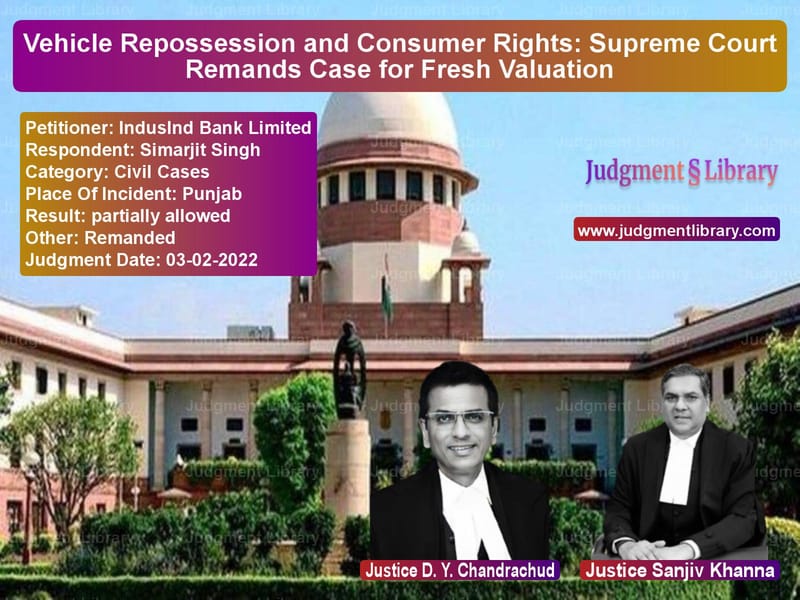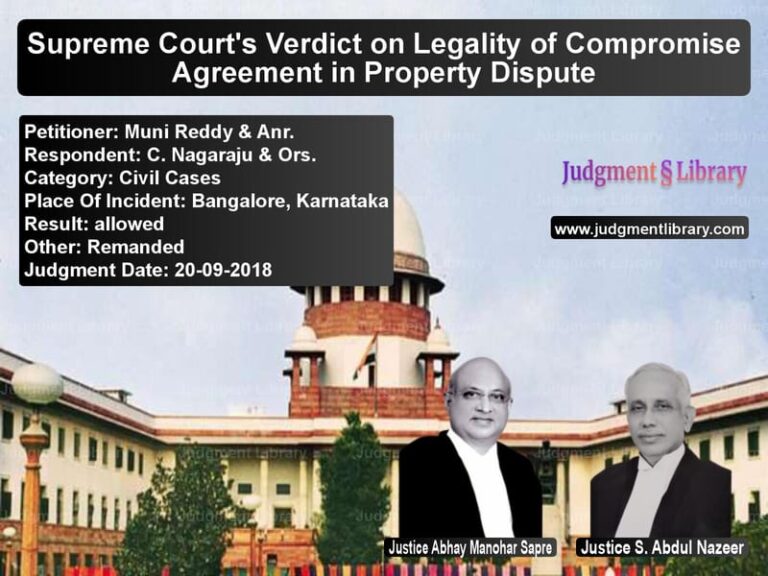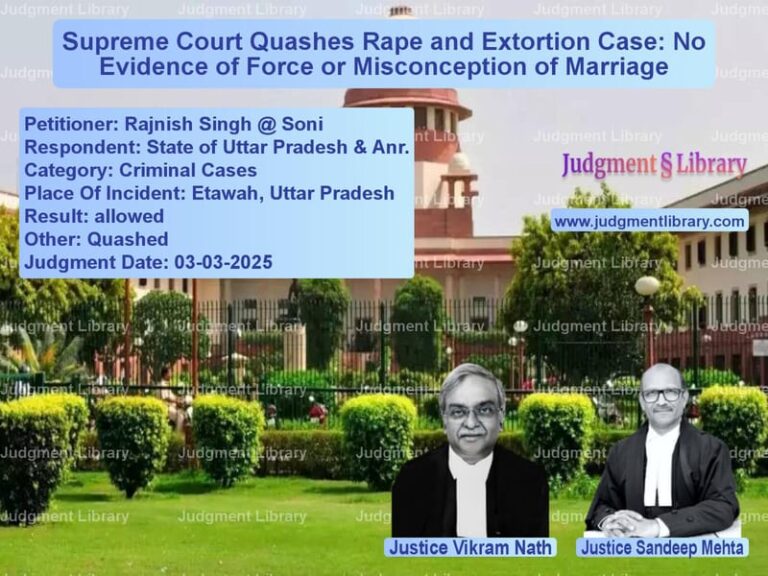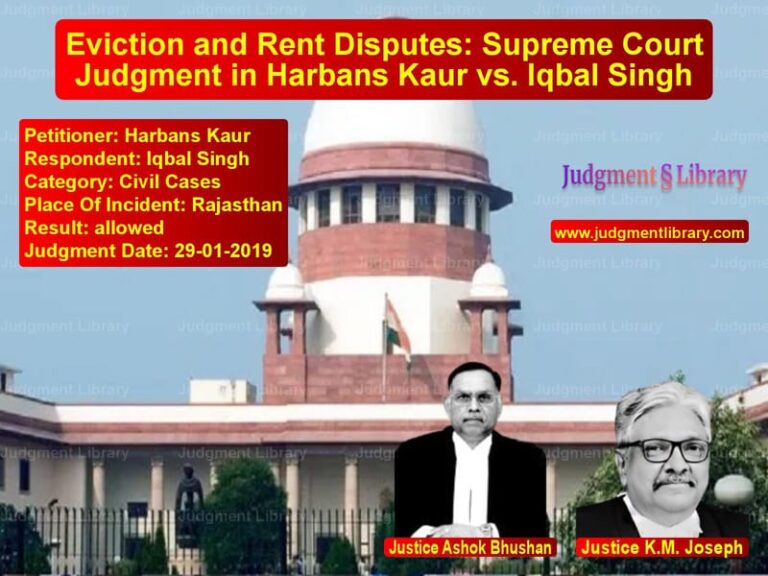Vehicle Repossession and Consumer Rights: Supreme Court Remands Case for Fresh Valuation
The Supreme Court of India recently delivered an important judgment in IndusInd Bank Limited & Another vs. Simarjit Singh, addressing the repossession of a financed vehicle and the compensation granted by consumer courts. The case revolved around whether the bank’s actions in seizing the vehicle were lawful and whether the awarded compensation was justified. The Supreme Court partially upheld the consumer forum’s decision but remanded the case for fresh determination of the timber’s value.
Background of the Case
The dispute arose when Simarjit Singh, the respondent, had taken a loan of ₹13,50,000 from IndusInd Bank Limited in July 2006 for financing a truck. The loan was repayable in equal monthly installments of ₹35,150. However, the respondent defaulted on three installments in October 2007, November 2007, and February 2008.
Key developments:
- The bank issued a demand notice on 12.03.2008 seeking payment of ₹1,39,335.
- The respondent subsequently paid ₹1,04,200 on 24.03.2008, ₹35,150 on 06.05.2008, and ₹36,000 on 31.05.2008.
- Despite clearing payments as per the schedule, the respondent’s truck was forcibly repossessed on 03.07.2008 while carrying a consignment of timber from Gujarat to Srinagar.
- The respondent filed a consumer complaint alleging unlawful repossession and loss of business.
- The State Consumer Disputes Redressal Commission (SCDRC) ruled in favor of the respondent, ordering compensation for the vehicle and lost timber.
- The National Consumer Disputes Redressal Commission (NCDRC) upheld the decision.
- The bank appealed to the Supreme Court, contesting the valuation of the timber and the compensation granted.
Petitioner’s Arguments
- The bank claimed that the truck was voluntarily surrendered by the respondent and was not forcibly seized.
- They argued that the valuation of the timber at ₹20,00,000 was arbitrary and unsupported by documentary evidence.
- The bank maintained that the vehicle repossession was lawful and in accordance with the loan agreement.
- They submitted additional documents before the Supreme Court to challenge the valuation of the timber.
Respondent’s Arguments
- The respondent contended that the truck was unlawfully taken despite clearing his loan payments.
- He argued that he suffered a significant financial loss due to the seizure of both the truck and the timber consignment.
- The respondent asserted that the truck union had settled the matter with the consignee, but no documentation could be produced as proof.
- He defended the consumer courts’ decisions as justified based on the circumstances.
Supreme Court’s Judgment
The Supreme Court partially allowed the appeal, affirming the compensation for the truck but remanding the matter for fresh determination of the timber’s valuation.
Key Observations of the Supreme Court:
- The Court noted that the SCDRC and NCDRC had not examined the basis of the ₹20,00,000 valuation of the timber.
- It held that while the bank’s repossession was wrongful, the compensation for the lost timber must be determined based on actual evidence.
- The respondent failed to produce any documentary proof, such as an invoice or confirmation from the consignee, to support the claimed valuation.
- The additional documents submitted by the bank before the Supreme Court, including transport records and invoices, suggested a lower valuation.
Key Excerpts from the Supreme Court Judgment
The Court observed:
“The orders of the SCDRC and the NCDRC to this extent are flawed. The respondent did not enclose and rely upon any document to support the valuation of timber and the claim for ₹20,00,000.”
Regarding the need for a fair assessment, the Court held:
“The matter must be remanded to the SCDRC to examine this issue afresh without being influenced by its earlier order, including the order passed by the NCDRC.”
On compensation for the vehicle, the Court stated:
“We clarify that we have not interfered with the direction requiring the appellants to pay ₹10,80,000 being the truck’s value along with interest at 9% per annum from 5th July 2008 till realization.”
Final Verdict
The Supreme Court issued the following directions:
- The bank must pay ₹10,80,000 for the truck, along with 9% interest from 05.07.2008.
- Compensation for loss of livelihood at ₹3,000 per month would be paid up to 31.10.2018, but not beyond that.
- The matter regarding timber valuation was remanded to the SCDRC for fresh assessment.
- The parties were directed to appear before the SCDRC and submit additional documents related to the timber’s valuation.
- The proceedings must be concluded within six months.
Conclusion: Implications of the Judgment
This ruling has important implications for consumer rights and financial institutions:
- It affirms that unlawful repossession of financed vehicles can result in compensation for consumers.
- Consumer courts must base compensation awards on clear evidence rather than assumptions.
- Financial institutions must follow due process in repossession cases and ensure they do not violate consumer rights.
- The ruling sets a precedent for balancing contractual obligations with consumer protection laws.
By remanding the issue of timber valuation, the Supreme Court ensured that compensation is determined based on fair assessment rather than speculative claims, upholding principles of justice and procedural fairness.
Petitioner Name: IndusInd Bank Limited.Respondent Name: Simarjit Singh.Judgment By: Justice D. Y. Chandrachud, Justice Sanjiv Khanna.Place Of Incident: Punjab.Judgment Date: 03-02-2022.
Don’t miss out on the full details! Download the complete judgment in PDF format below and gain valuable insights instantly!
Download Judgment: indusind-bank-limite-vs-simarjit-singh-supreme-court-of-india-judgment-dated-03-02-2022.pdf
Directly Download Judgment: Directly download this Judgment
See all petitions in Consumer Rights
See all petitions in Contract Disputes
See all petitions in Damages and Compensation
See all petitions in Banking Regulations
See all petitions in Debt Recovery
See all petitions in Judgment by Dhananjaya Y Chandrachud
See all petitions in Judgment by Sanjiv Khanna
See all petitions in partially allowed
See all petitions in Remanded
See all petitions in supreme court of India judgments February 2022
See all petitions in 2022 judgments
See all posts in Civil Cases Category
See all allowed petitions in Civil Cases Category
See all Dismissed petitions in Civil Cases Category
See all partially allowed petitions in Civil Cases Category







